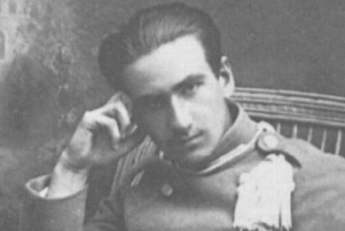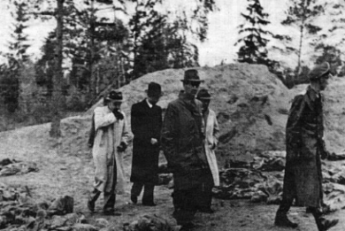
“Editor” Bohdan Mackiewicz
Everyone has heard of Józef Mackiewicz, a writer, publicist and anti-communist, as well as his brother Stanisław Mackiewicz (pseudonym “Cat”), editor of the “Słowo” in Vilnius and prime minister in exile. But few have heard of the little-known “editor” Bohdan Mackiewicz. Who was he?
It is worth starting with the fact that he has nothing in common with the Mackiewicz brothers, except for the coincidence of surnames. He came from the Kamień region, for some time he was even assigned to the secret security of President Wojciechowski, and then he worked in the administration of “Kurier Warszawski” and was promoted to the head of the branch in Vilnius. Józef Mackiewicz stated that “He was generally liked in the journalistic circle as a “reveler”, which is better described by the Russian word “sobutylnik”. The nickname “editor”, as the author of the “Road to nowhere” explains, comes from the fact that he wrote two correspondences to Warsaw, which made him a member of the Syndicate of Journalists – members of this Union were entitled to the title of “editor”.
“Bohdan Mackiewicz particularly valued this title, because otherwise he did not show any great ambitions, being in fact an administrative employee, not an editorial one,” wrote Józef Mackiewicz in “Wiadomości” in 1971.
“In December 1939, during the Lithuanian times, as the editor-in-chief and publisher of “Gazeta Codzienna”, I hired Bohdan Mackiewicz as deputy administrator, who at that time was the former administrator of “Słowo”, Kazimierz Luboński. It seems that at that time the only editorial function performed by Bohdan Mackiewicz at my request was to ask Stefan Jędrychowski, the current minister of foreign affairs of the People’s Republic of Poland, who wanted to take over the “economic section” in the editorial office of my “Gazeta”. Soon, however, the Lithuanian authorities took away my license to edit and publish the magazine. Bohdan Mackiewicz remained at Gazeta Codzienna and joined the “Publishing Collective” after the Bolsheviks entered in 1940. He was featured in the photograph of this “Collective” published in the newspaper, cunningly turned backwards. Only his name gave him away. I remember – being a truck driver by then – how he used to make fun of me that under his name readers probably think it’s me. But apparently they didn’t. – Soon the Bolsheviks closed both Polish newspapers (“Gazeta Codzienna” and “Kurier Wileński”) and created one in their place: “Prawda Wileńska”. Bohdan Mackiewicz worked there. He traded, like many people back then, he speculated on the black market, for which he had an extraordinary talent, wrote Józef Mackiewicz.
When the Germans entered in 1941, when “Goniec Codzienny” began to be published, Bohdan Mackiewicz became the deputy administrator in this newspaper, whom was Eugeniusz Kotlarewskij.
The place of “Goniec Codzienny” became a chosen meeting place, and soon a kind of “commercial” center and black market exchange, of which so many inhabitants of the city lived in those gloomy times. Administrative room of “Goniec”, separated by a wooden partition with windows for receiving announcements, subscriptions, etc. it was perfect: it guaranteed maximum security: a larger group did not arouse suspicion, as it was explained by clients who came to pay a subscription or to place an advertisement in the newspaper; as a German institution, it protected against the intrusion of the Lithuanian police pursuing speculation, etc.
“Personally, living in Czarny Bór, 12 km away from the city, when I came to Vilnius, I also used this place as the first “base” for orientation, especially in winter, where you could warm yourself up, meet this and that, find out about the state of security in the city, in general, “what’s up?”, to sell something, to orientate yourself in the prices of the black market” – recalled Józef Mackiewicz.
“Well, the crowd of people gathering there every day was ruled, if not as a king, then at least as a rabbit of the Vilnius black market, the “editor” Bohdan Mackiewicz. Many, if not most, of his clients were his personal clients. He also had an extensive clientele among the privileged Lithuanian population. Hence, over the heads of the inspectors of “Goniec Codzienny” from the morning until closing, there was a constant call: “Editor Mackiewicz!”, “Where is editor Mackiewicz?!”, “Editor Mackiewicz to the phone!”, “Is editor Mackiewicz gone”! “When will editor Mackiewicz come?” – and in this unending discussion of matters” – continues Mackiewicz in the article.
The coincidence of the names was used for later intrigue. “Editor Mackiewicz!” resounding in “Goniec” during those years could, indeed, confuse many a regular from the city, but never the managers of the intrigue. They knew exactly that the editor of “Goniec” was Ancerewicz, and after he was shot, Lubiążyński. Not a modest administrative worker, Bohdan Mackiewicz, who, as a result of a “misunderstanding”, was allegedly confused with… Józef Mackiewicz. No, this “misunderstanding” was both prepared and maintained, with all premeditation and awareness of the falsehood and the goals it serves, wrote Józef Mackiewicz later.
“Bohdan Mackiewicz later surfaced in Warsaw in the halo of a silent hero, where he also ended his life. Already in Munich, I heard the news that he had joined the party before his death. The thing would be trivial, but not confirmed,” Mackiewicz recalled in his article.
The story of the mysterious “editor” Bohdan Mackiewicz is extremely strange. As a result of a “misunderstanding” caused by the convergence of names, a campaign was prepared against the author of “Left Free”, which, according to Mackiewicz, was not accidental.
Sources:
News, 1972, No. 43 (1334)






